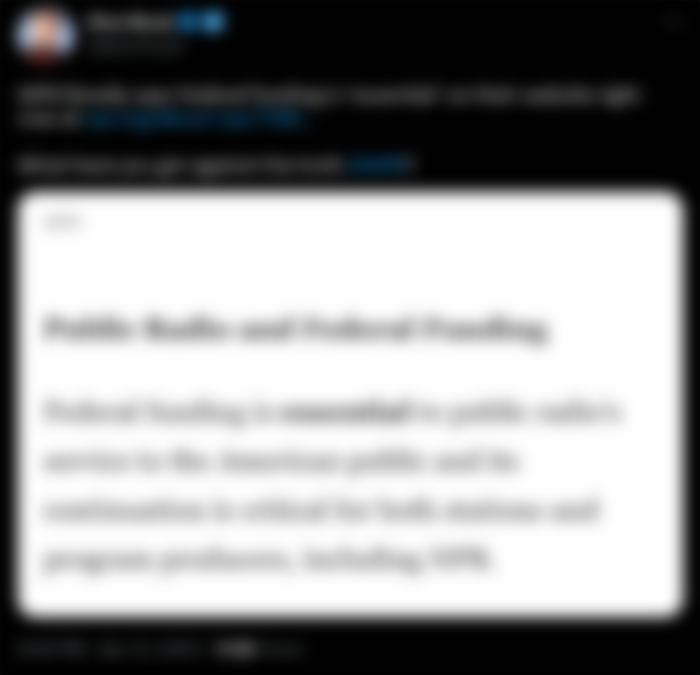Elon Musk Labels State-Affiliated Media as State-Affiliated Media, Hilarity Ensues
Co-published on Publish0x and Zirkels.
Not a week goes by without some drama regarding Elon Musk and Twitter. There was a big hoopla regarding Twitter Blue and the new checkmark system; Twitter open-sourced some of its algorithms onto Github last month, revealing that the US government could intervene at its request; and most notably, the Twitter Files revealed a lot of political corruption regarding old Twitter, the COVID response, and more.
In this still very young, but already entertaining saga, Elon Musk has pissed off some media organizations for (accurately) labeling them as state-affiliated media and it's hilarious.

It now says government-funded media, but it brings the same point across.
NPR and PBS Ragequits Twitter
On April 12, NPR announced it would no longer be active on Twitter as it claimed that platform undermined its credibility and "falsely implying" its lack of independent journalism. In its own editorial, NPR says only 1% of its annual budget comes from federal sources. Musk rebutted by citing NPR's own "Public Radio Finances" page, pointing out that the organization explicitly describes federal funding as "essential". Further in, NPR goes on to say that its "station programming fees comprise a significant portion of NPR's largest source of revenue. The loss of federal funding would undermine the stations' ability to pay NPR for programming, thereby weakening the institution".

Something that I also noticed was NPR made a strawman argument as it only cited federal funding despite the fact that not all government funds are federal. When looking at its FY20 revenue chart, 5% comes from federal, state, and local governments. The organization also receives government funding indirectly via the Corporate for Public Broadcasting (8%), a publicly funded non-profit. Another 9% comes from foundations, many of whom I assume are non-profit and thus, another indirect source.
Not long after NPR's ragequit, PBS also suspended its Twitter operations for the same reasons.
It's rather interesting how both organizations decided to leave Twitter instead of suing the platform and Musk for defamation. If they can prove in court that the state-affiliated label is objectively false, then the rest of the case will be relatively easy. With how large a platform Twitter is, it's not hard to imagine NPR and PBS can prove immense damages. It will also not be that difficult to prove intention and malice. The fact that NPR and PBS have qualms with the state-affiliated label, but have not pursued Musk in court is incongruous and very telling.
And that's only half the drama. Around the same time, the BBC also wanted a piece in the action. In fact, it decided go close and personal, and... it went as well as you would've expected from a(n) (also government-funded) mainstream news organization.
The BBC Swings and Misses
On April 11, BBC North America technology correspondent James Clayton gave a 1 hour interview (also on Twitter Spaces) with Elon Musk. The most viral portion of the interview was when Clayton claimed that he observed an uptick in "hateful" content on his "For you" feed and Musk asked him to provide an example. Clayton could not provide one example and tried to skirt by with vagueness. When asked to describe what constitutes as "hateful" content, Clayton used very vague terms like "slightly racist" and "slightly sexist". When Musk kept asking Clayton to provide an example, the latter made an excuse that he does not use the "For you" feed anymore. However, he contradicted himself as a minute earlier, he said "Personally, my "For you", I would see I get... I get more of that content personally".
Clayton immediately shifted the topic to COVID misinformation as he tried to call Musk out on changing Twitter's COVID misinformation policy. That also did not go well as Musk asked Clayton if his organization changed its COVID misinformation and it led to a long awkward pause where Clayton could not provide a rebuttal.
Not shown in BBC's official video, but the live feed continued to air after the interview was over. There was a stark difference in body language between Musk and Clayton. While Musk was genuinely laughing at the feedback of the interview on Twitter, Clayton tried to establish control of the dialogue, but it resulted in a stuttery mess.
Conclusion
If you follow me long enough, you would know that I highly distrust the mainstream media. From Bloomberg spreading unironic misinformation about gas stoves to the sudden heel turn on the COVID lab leak theory to the Washington Post employing cry bullies, such malpractices are not exceptions to the rule, but rather exceptionally common. Whether you like or dislike Musk, it is undeniable that with his clout and Twitter's large userbase, he's bringing a lot of attention of the mainstream media's shenanigans to those who would have otherwise been unaware.


On NPR's statement...
It's like saying...
"No, I don't buy my coffee from Starbucks."
While holding a cup of coffee on a tumbler from Starbucks!
LOL!